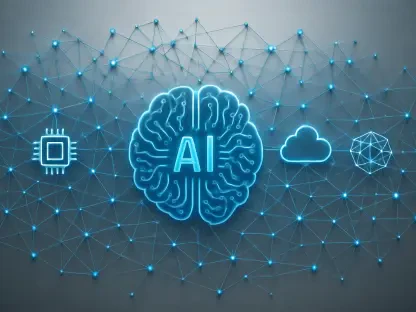NetApp recently announced the introduction of various new capabilities designed to support strategic cloud workloads, including Generative AI (GenAI) and VMware, aimed at driving business innovation. These enhancements are targeted at improving their intelligent data infrastructure to meet the demanding requirements of modern, complex workloads. This development marks a significant stride toward offering more advanced, scalable, and flexible data solutions to businesses globally.
New Capabilities Introduced by NetApp
NetApp BlueXP Workload Factory for AWS and Its Advantages
The NetApp BlueXP Workload Factory for AWS is one of the notable introductions aimed at automating the planning, provisioning, and management of cloud resources and services for key workloads like GenAI, VMware cloud environments, and enterprise databases. This new capability represents a major leap in the efficiency and ease with which organizations can deploy and manage their cloud services. By automating these critical aspects, companies can save valuable time and resources, allowing IT personnel to focus on more strategic initiatives within the organization.Moreover, the Workload Factory is designed to enhance performance, ensuring that the resources are optimally utilized, thereby driving better outcomes for cloud environments. This automated system is particularly beneficial for data-intensive operations requiring high levels of scalability and flexibility. Its deployment can significantly reduce human errors, elevating the reliability and consistency of cloud operations. By integrating these capabilities into AWS, NetApp not only simplifies cloud management but also adds a layer of intelligence to the operational processes, fostering a more productive and innovative environment for businesses.
Enhancing Generative AI with NetApp GenAI Toolkit
Another key highlight from NetApp is the introduction of the NetApp GenAI Toolkit – Microsoft Azure NetApp Files Version. This toolkit is designed to improve the ability of Generative AI projects to produce high-quality, highly relevant results by merging proprietary data with pre-trained foundational models. This integration is crucial as it leverages specialized data unique to the enterprise, enhancing the precision and relevance of AI outputs.The GenAI Toolkit ensures that the data pipelines are seamlessly connected, providing a robust infrastructure that can handle the intensive computational demands of AI projects. By coupling enterprise-specific data with pre-trained models, organizations can achieve more accurate and contextually relevant outputs. This capability is a significant advancement for sectors that rely heavily on data-driven insights and predictive analytics. The toolkit not only supports the creation of more reliable AI models but also streamlines the overall development process, making advanced AI accessible to a broader range of businesses.
Enhancements in Cloud Storage and Disaster Recovery
Amazon Bedrock with Amazon FSx for NetApp ONTAP
NetApp has also rolled out improvements in the Amazon Bedrock with Amazon FSx for NetApp ONTAP Reference Architecture, designed to guide the implementation of Reference Architecture Generation (RAG)-enabled workflows. This architecture is aimed at incorporating proprietary data stored on Amazon FSx for ONTAP into GenAI data pipelines. Enhancements to Amazon FSx for NetApp ONTAP focus on improving scalability and flexibility, offering up to 6 GB per second throughput for a single highly-available pair, with up to 512 TiB of SSD storage.This scalability is essential for enterprises managing massive datasets and undergoing rapid growth. The capability to handle such high throughput ensures that performance remains optimal even under heavy load, making it an ideal solution for large-scale AI projects and data-intensive applications. This improved storage option provides companies with the necessary infrastructure to support their most demanding workloads, ensuring reliable and efficient data processing across various applications and cloud environments.
Expansion of NetApp BlueXP Disaster Recovery Support
In addition to cloud storage enhancements, NetApp has expanded its BlueXP Disaster Recovery Support for VMFS. This development supports automated disaster recovery plans for VMware workloads across both on-premises and cloud environments, now including support for VMFS datastores for on-premises to on-premises disaster recovery. This expanded support is critical for ensuring business continuity and minimizing downtime in the event of a disaster, which is a top priority for many organizations.The automated system significantly reduces the manual effort involved in disaster recovery, enabling faster and more efficient restoration of services. With this capability, businesses can safeguard their critical operations and data assets, ensuring that they can quickly recover from disruptions. This is particularly important for industries with stringent uptime requirements, where even minimal downtime can result in substantial losses. By enhancing its disaster recovery solutions, NetApp provides a robust safeguard for businesses, allowing them to maintain stability and resilience in their operations.
Industry-wide Implications of NetApp’s Enhancements
Trends Driving the Need for Advanced Data Infrastructure
The latest advancements by NetApp reflect an overarching industry trend where businesses are increasingly relying on advanced, scalable, and flexible data infrastructure to support complex workloads and foster innovation. These enhancements mark a broader shift towards integrating more automated and intelligent solutions to handle data-intensive operations effectively. This move is driven by the growing demand for higher performance, greater efficiency, and improved reliability in data management and processing.Adopting such advanced infrastructure solutions is becoming a necessity as the volume, variety, and velocity of data continue to grow exponentially. Companies are recognizing the critical role that data plays in driving strategic initiatives and business growth. By investing in more sophisticated data infrastructure, businesses can harness the full potential of their data, leading to better decision-making, enhanced operational efficiency, and greater competitive advantage. NetApp’s new capabilities are timely, offering businesses the tools they need to navigate the increasingly complex data landscape.
NetApp’s Strategic Direction and Business Impacts
NetApp recently unveiled a series of new features aimed at boosting strategic cloud workloads, including Generative AI (GenAI) technologies and VMware integrations. These innovations are specifically designed to enhance their intelligent data infrastructure, enabling it to handle the rigorous demands of contemporary, intricate workloads. By focusing on these advanced capabilities, NetApp is making a substantial leap forward in providing more sophisticated, scalable, and adaptable data solutions to businesses worldwide.These updates represent a critical advancement for companies seeking to leverage cutting-edge technologies for greater innovation and efficiency. The integration of GenAI and VMware is particularly notable, as it aligns with the growing trend toward using AI to drive business processes and decision-making. As the volume and complexity of data continue to grow, NetApp’s enhancements are positioned to offer significant value to enterprises looking to streamline their operations and stay competitive in a rapidly evolving market.In summary, NetApp’s latest offerings underscore their commitment to advancing data infrastructure technology, empowering businesses to meet modern-day challenges with more robust and versatile solutions.









